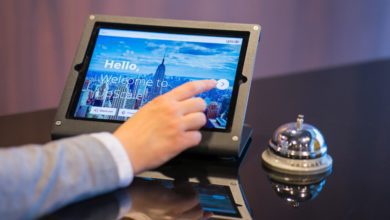How modern payment technology can keep guests coming back
By Lennert De Jong, president of hospitality at Planet

Visit Britain is forecasting 35.1 million tourist visits in 2023, with an expected spend of £29.5bn. Even our own March Planet Intelligence data is showing signs of green shoots, with UK hotel payments set to rise by 18% compared with 2022 and by 37% for the year to date. As we optimistically look to a future where travel and holidaying is once again the norm, what can hotels be doing to not only attract new guests, but keep them coming back?
For decades, the hotel industry has been undergoing a technological revolution. There have been changes in pricing, new business models, and more distribution strategies than ever. But when you look at what the guest actually experiences, not much has changed; in most cases, we still queue for check-in and out, and technology often doesn’t extend further than viewing the room service menu on the TV or through an app. Key cards are also still largely a mainstay. Put simply, the hotel experience has actually changed very little for the guest.
Part of the issue is the hospitality industry’s global nature. Ownership is fragmented with thousands of local – and very few global – players on each side. What also doesn’t help this fragmentation is the triangular relationship: an owner who needs to pay for everything; a management company that comes in with best practices; and a brand. Sometimes, the last two are the same, but a lot of the time they’re not.
What’s more, the different aspects of the guest experience are managed by a diverse array of technology suppliers. The choice is overwhelming and staff struggle to integrate a patchwork of applications to support disparate software and payment systems.
On average, a typical hotel chain operates 18 distribution channels and just 60% of hotels adopt a fully integrated approach to distribution. This leads to an inconsistent experience between every hotel and leaves guests to shoulder the burden of the friction.
Addressing payments systems is where hotels can really bring their A-game and drive loyalty, and it comes down to embedding payments into the property management system (PMS).
Firstly, it allows hotels to better leverage data and provide a more seamless experience, emulating that of companies like Uber and Amazon Go, where payment cards are linked to customer profiles to simplify the process and gain insight into user behaviour. Hotels should be able to offer a similar experience. For example, not needing to ask if it’s a guest’s first time staying with them and allowing the guest to simply double tap their card and be recognised by the hotel, even if they’re staying for the first time and aren’t in a loyalty programme. With 84% of hoteliers striving to improve guest profile management and experience, it’s clear integrating this technology should be a priority.
Secondly, it drives efficiency. 73% of hoteliers state that an integrated PMS-payments stack saves time at check-ins and reduces wait times – a guaranteed way to enhance the guest experience. This time saved also means hotel staff can focus on doing what they do best – delivering the highest-quality customer service.
What’s more, with cybercrime posing a constant threat to hoteliers in our digitally-driven world, an integrated PMS system adds a layer of support. Having to notify guests that their personal or financial data has been leaked is a sure-fire way to damage loyalty, but an integrated PMS with payment offers enhanced security features, such as encryption and tokenisation, protects sensitive financial data and reduces the risk of cybersecurity violations. Integrated payments are handled in a PCI compliant environment, which also means the data won’t touch the hotel’s network, giving them added peace of mind.
Hotels and their workforces have struggled with disparate reports, frustrating back-office recons, and disconnected systems for far too long. Now, as travel starts to look promising once again, it’s time to truly focus on this to ultimately boost guest loyalty. While making the switch to integrated PMS systems may seem daunting, the benefits of doing so are clear and it’s the primary way to build brand love and keep guests checking-in time and time again.









